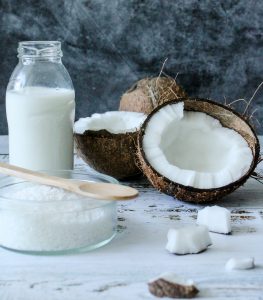
Year: 2019 and 2027
Market size: $52.5 million and $113.0 million, respectively
Sources: “Coconut Milk Powder Market Size, Share & Trends Analysis Report by Product (Organic, Conventional), by Application (B2B, B2C), by Distribution Channel (Offline, Online), by Region, and Segment Forecasts, 2020 – 2027,” Grand View Research Report Summary, June 2020 available online here; “Coconut Milk Powder Market Size Worth $113.0 Million by 2027 | CAGR 10%: Grand View Research, Inc.,” CISION PR Newswire, June 16, 2020 available online here; Boriana Slabakova, “The Age of Veganism,” Health Careers Blog, January 7, 2020 available online here.
Image source: Adapted from: Tijana Drndarski, “Raw Coconut Products, Coconut Flakes and Coconut Milk,” Pixabay, May 2, 2020 available online here.
Sixty-five percent of the global population is lactose intolerant, including 90% of the people in the Asia-Pacific region. In addition, the rise in health consciousness coupled with the rise in veganism has consumers worldwide seeking dairy alternatives. As of January 2020, the global market for dairy alternatives totaled $18.12 billion, a 144.9% increase from $7.4 billion in 2010. Plant-based milk constitutes 13% of the entire milk market and more than 50% of the vegan food market. Coconut milk powder is one type of dairy alternative that is expected to see significant growth in the near future.
Today’s market size shows coconut milk powder revenues for 2019 and projected for 2027. For consumers who like to buy in bulk and for those that cannot buy liquified coconut milk on a regular basis, coconut milk powder, with its long shelf life, is a convenient alternative. For many cultures such as Brazilian, Burmese, Indian, Thai, Indonesian, Hawaiian, Singaporean, Sri Lankan, and Vietnamese among others, it is considered a staple of their cuisine. Because of this, the Asia-Pacific region held a third of the market in 2019.
Commercially, coconut milk powder is used to prepare smoothies, shakes, ice creams, cakes, donuts, sauces and gravies. The growing demand for vegan ice cream and desserts at dine-in hotels and quick-service restaurants is expected to contribute to growth in the business-to-business (B2B) sector. In 2019, more than 66% of sales were in the B2B segment. The business to consumer segment is expected to have the fastest growth rate, a compound annual growth rate of 10.7% from 2020 to 2027.
Conventional coconut milk powder was the first type to be introduced to the market. In 2019, it claimed more than 70% of revenues. While it is more economical than the organic variety, organic coconut milk powder revenues are expected to grow the fastest through 2027 due to increased demand for organic products in general, products without chemical fungicides, herbicides, or insecticides and grown in an eco-friendly way.
Most manufacturers are small, catering to local markets. Some larger manufacturers include Nestlé Inc., Anthony’s Goods, BareOrganics, Bramble Berry Inc., Dr. Ben Kim Natural Health Solutions, Enerhealth, Grace Foods Canada Inc., Healthworks, King Arthur Flour Company Inc., and KOS.
